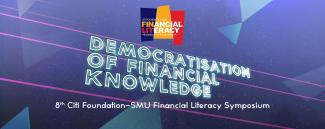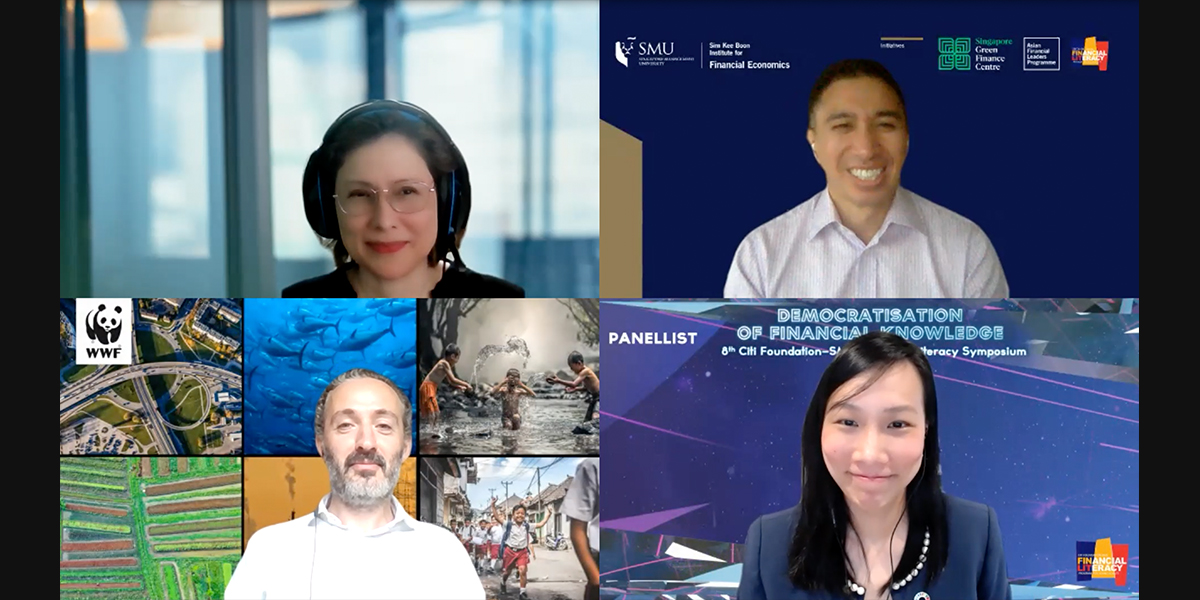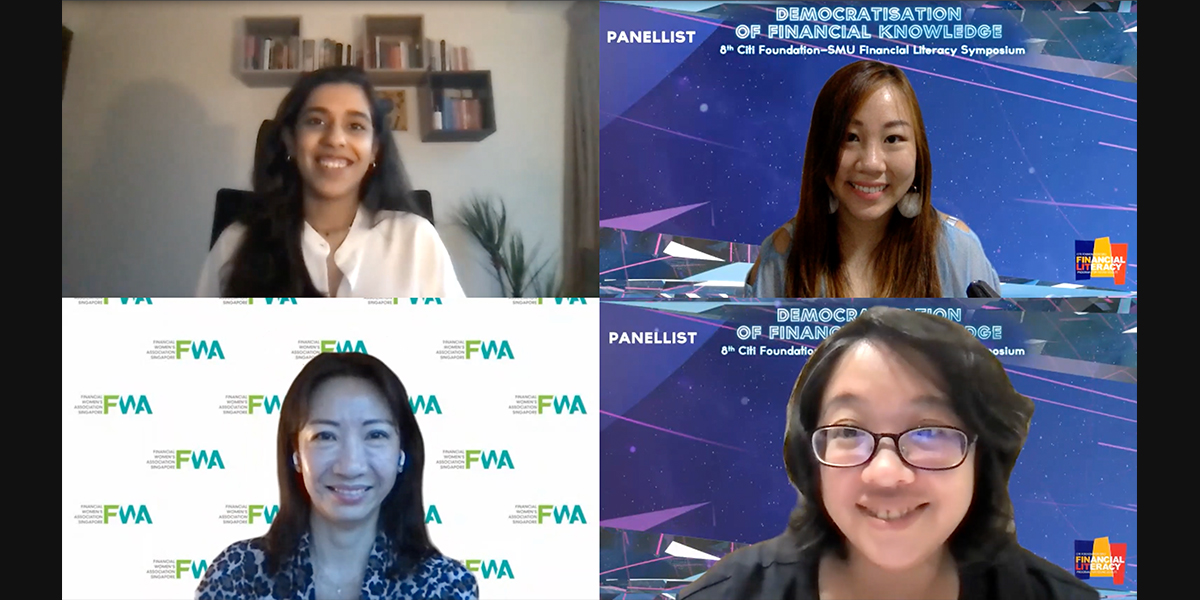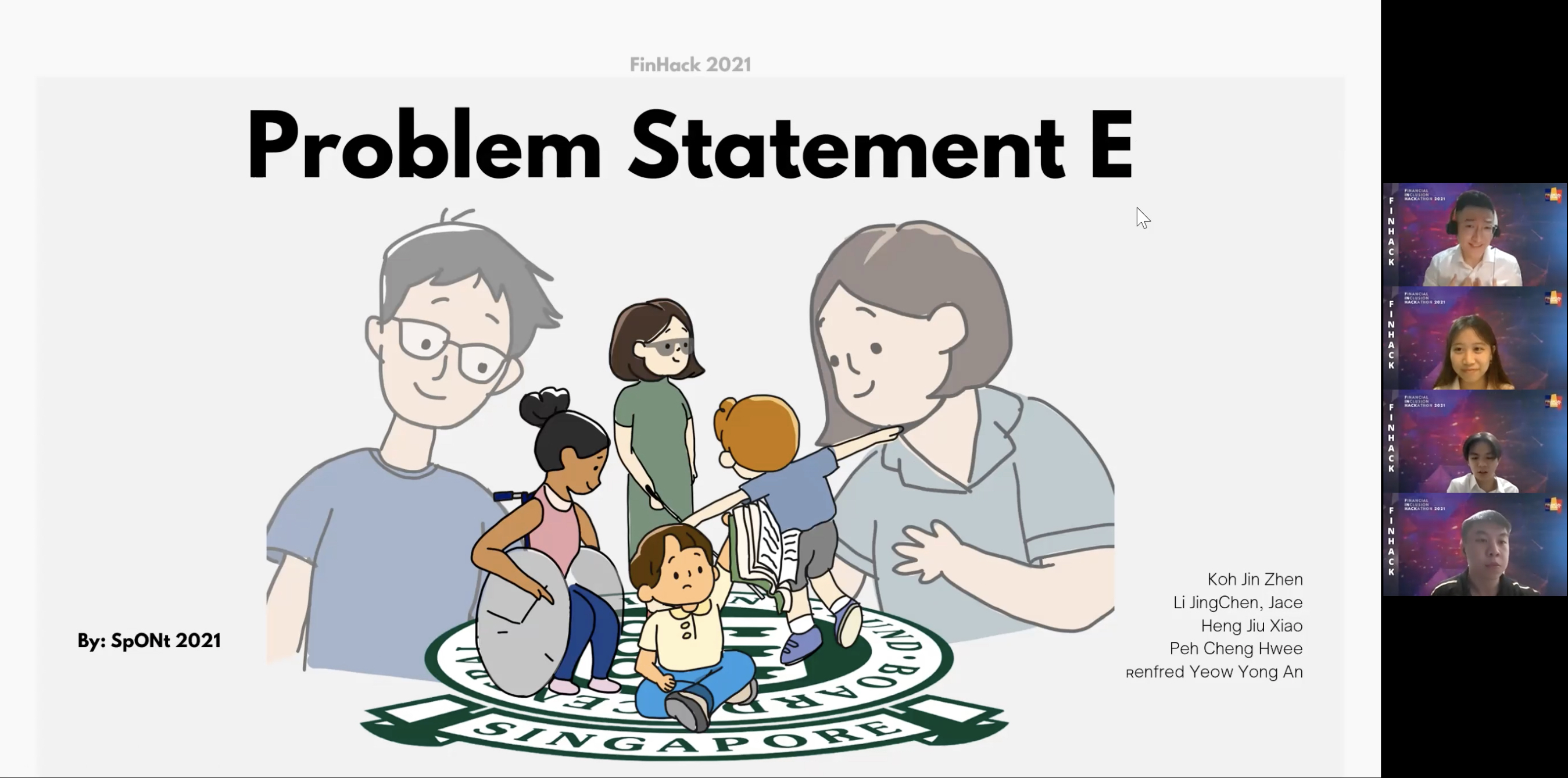
An inaugural survey conducted by the Citi Foundation- SMU Financial Literacy Programme for Young Adults (Citi Foundation-SMU FinLIT Programme) found that one in three respondents are not confident in managing debt, 19% found it difficult to make ends meet, and 22% would find it difficult to arrange for emergency cash. On the other hand, close to 97% of them have started planning for retirement, 98% would find it easy to arrange for emergency purchases.
These were some of the Financial Inclusion, Wellness and Resilience (FInWR) survey findings which Assistant Professor Aurobindo Ghosh, Citi Foundation-SMU FinLIT Programme Director and Principal Investigator (Research), shared in the first keynote speech at the 8th Citi Foundation-SMU Financial Literacy Symposium held virtually on 10-11 September. He is also the head of the FInWR research project.
This national benchmarking survey, conducted between March to April 2021, included 1,068 respondents who are young adults aged between 18-30. It aims to understand the factors influencing financial wellness – including financial literacy – amongst young adults in Singapore, and to ascertain their capacity (i.e. resilience) to withstand financial challenges, in light of potential disruptions caused by the ongoing pandemic, the changing financial landscape and the evolving job market.
The survey also found there is a difference between FInWR scores across different disciplines of study. Respondents from disciplines such as Business, Information and Digital Technology, have a higher likelihood of being on higher percentiles of FInWR scores compared to certain disciplines like Art, Design and Media, Dentistry. In addition, young adults trained in Business tended to place higher in financial wellness and resilience than those trained in non-business subjects (medicine, dentistry, engineering, arts, media and design). Non-STEM students also tended to have higher FInWR score than STEM students.
Prof Ghosh said, “Financial wellness and financial resilience are key factors of personal and professional development goals that are catalysed by financial inclusion. Individuals with working financial knowledge and thus sufficient financial wellness and resilience at an early stage can make more informed economic decisions and judgements vis-à-vis the aggregate population. In sum, in this ongoing research, we want to produce a comprehensive quantitative measure of participants’ financial wellness and resilience score to benchmark future improvements and study the relationship and dynamics among these components.”
Financial resilience amid the pandemic
Some 600 participants, including students from the Institute of Technical Education, Polytechnics and Universities, and the rest from government agencies and partner organisations, attended the two-day Symposium.
Guest-of-Honour Ms Gan Siow Huang, Minister of State for Education and Manpower, kicked off the event with a Welcome Address. She said the COVID-19 pandemic has thrown into sharp focus the importance of financial resilience in times of crisis. “At the national level, our financial reserves enabled us to not only meet the immediate needs of the current crisis, but also build capabilities to emerge stronger for the future. Financial decisions made decades ago and reserves painstakingly set aside by our earlier generations had allowed Singapore to respond swiftly and sufficiently today.”
Noting that financial resilience does not happen overnight, Ms Gan added “Financial literacy is the key building block of financial resilience. Our shared vision is to build a financially inclusive community, where everyone has access to information and tools to plan ahead and make informed financial decisions.” She also commended Citi Foundation-SMU for the good efforts in addressing financial concerns close to the hearts of our youths.
In her speech, SMU President Professor Lily Kong said that despite the pandemic induced restrictions, the Citi Foundation-SMU FinLit Programme demonstrated resilience and continued its efforts and initiatives by pivoting to a hybrid and mostly online mode of delivery. Applauding the Programme’s efforts to increase financial literacy awareness in Singapore, SMU President Professor Lily Kong agreed that the FInWR survey findings “are an important reference for various stakeholders to formulate intervention measures for different young adult groups to level up their financial literacy, and beyond that, strengthen their financial resilience.”
Looking ahead, Prof Kong said the Citi Foundation-SMU Programme will embark on even more initiatives. “Digital transformation, expedited by the pandemic, has presented myriad opportunities, such as digital learning, analytics, and fintech that will affect and catalyse the future of work. The Programme will continue to work with like-minded partners to deliver greater financial and digital literacy among young adults in Singapore.”
Ms Ashmita Acharya, Retail Banking Head, Citibank Singapore lauded the Citi Foundation-SMU FinLit Programme’s unique peer-to-peer training model and creative engagement approach which have supported many young adults from all walks of life to start their financial journey on a right footing. “To be specific, that is more than 1,100 student trainers certified across different institutes of higher learning, and over 70,000 young adults trained in financial literacy.”
She noted that the latest Citi Foundation-SMU FinLit Programme report showed that three to six months after participating in the Program, more than 73% of participants demonstrated an improved financial literacy score based on the S&P Global Financial Literacy Survey Questionnaire. “For the young adults, fundamental financial management like budgeting and learning the different ways to steward your resources are important life skills that will put you in good stead in life,” she added.
Ms Acharya also announced the Citi Foundation will continue to support the Citi Foundation-SMU FinLit Programme in 2022 with a funding S$448,000 to SMU. With this latest gift, Citi has cumulatively contributed more than S$4.2 million to the Programme since the Programme’s inception in 2012.
SG Women: Financial Well-being, Independence and Resilience
Dr Joanne Yoong delivered the second keynote speech on Day 2 of the Symposium. She is the Visiting Faculty at Sim Kee Boon Institute for Financial Economics, SMU; Senior Economist & Director, University of Southern California-The Center for Economic and Social Research; CEO, Research for Impact Pte Ltd.
Dr Joanne Yoong shared that 67% of men vs 52% of women surveyed in Singapore in the 2015 Standard & Poor’s (S&P) Global Financial Literacy Survey were financially literate. This gap of 15% is 3 times the global average gap of 5% and is the largest among countries in the survey.
Furthermore, she shared the success of Citi-Tsao Financial Education Programme launched in 2008 in Singapore for women aged 40-59, with curriculum focusing on both financial and social empowerment. Strongest impacts were reported in the areas of money management and budgeting, as well as better understanding of their own investing and savings. Overall, participants reported more control and reduced stress related to financial decisions, as well as indicators related to financial self-sufficiency.
In conclusion, she highlighted that it is never too late to help and never too early to start. There are some gaps that we should focus on: the longevity needs gap and the wealth gap (including wage gap, personal and professional investing gaps). On personal investing, she opined that we should look at the financial planning, financial literacy and confidence gaps among women.
Panel discussions
There were two panel discussions on the first day of the Symposium. The first discussed “FinTech and Financial Inclusion: A Plausible Matrimony?”
The panel focused on how COVID-19 has accelerated the speed at which FinTech is being adopted by governments, corporations and small businesses across the world. Disruptive FinTech tools such as Roboadvisors, Cryptocurrency and DeFi have totally shifted the playing field for the banking and finance sector. On the flipside, panellists observed that security and privacy concerns are major foreseeable challenges that individuals, corporations and governments would face in the future. The discussion ends with an agreement among the panellists emphasising the importance of financial literacy when managing one's finances.
The second panel discussion focused on "Financing a Sustainable Future”.
The panel explored the potential of Sustainable Finance in guiding all stakeholders - governments, businesses and individuals, in making smarter decisions that would benefit our environment and community as a whole. The current Sustainable Finance scene, and the various products and tools available, cannot deliver their full potential until official taxonomies that are curated based on solid data, govern and regulate the industry. Additionally, the questionable aspects of Sustainable Finance, namely the possibility of it being a façade exploited by organisations who are really just green washing, was also discussed. The panellists highlighted the pertinence of the role that the Sustainable Finance industry has to play in ensuring that we internalise the consequences of the decisions we make, and channel resources to areas to benefit our world and elevate its ability to stay sustainable and resilient.
The Symposium presented two panel discussions during the second day, starting with “Financial Resilience in the Gig Economy”.
The panel focused on understanding the landscape of the gig economy as well as the first-hand challenges faced by gig workers. Insights with regard to the government’s initiatives to overcome the lack of personal finance management by individuals in the gig economy were shared. While the gig economy platform provides an attractive source of income for Singaporeans, issues arise with the digital divide in Singapore. Specifically, the older generation are often seen to be left with the shorter end of the stick and lose out on the earning opportunity. The panel also explored how the current initiatives in place to close the digital and financial literacy gap could be further plugged. The panel concluded that there will be an upwards growth trajectory in the gig industry and it is crucial that we embrace this trend and prepare for it.
This was followed by a discussion on “Every Woman Can Be Her Own CFO”.
The panel discussed the root causes of the persistent gender gap in financial literacy, as well as the impact that the gap has on individuals and the society as a whole. Interesting findings and insights from a Financial Women’s Association Singapore (FWA) report on financial literacy of different groups of people also shed light on some drivers behind the discrepancy in financial literacy between both genders. The panel also focused on how we can enhance women’s financial literacy knowledge and came to a consensus that social media is one of the most effective platforms today to gain financial literacy knowledge. Additionally, the panel shed light on the various factors that play a critical role in increasing women’s confidence in financial literacy, including the support from their spouses to take ownership of financial planning themselves, as well as to have the consistent initiative to learn from the people around them instead of conforming to gender stereotypes. Wrapping up, the panellists underscored the importance of being responsible for one’s financial planning journey instead of relying on others for our financial resilience.
FInHack Demo Day
The inaugural Financial Inclusion Hackathon (FInHack) 2021 seeks to harness and catalyse innovative solutions to address real world needs in the area of Financial Inclusion. Teams raced to come up with novel solutions to Problem Statements on the theme “Financial Literacy in the Digital Age”. A total of 24 teams took part in the competition.
The Top 5 Finalists presented their two-minute elevator pitch on their solutions for live audience voting during the FInHack Demo Day on Day 1 of the Symposium. They were shortlisted after rigorous rounds of consultation sessions with Citibank Project Advisors, judging and interviews by SMU faculty and Project Champions over the past month.
Team SpONt from NTU and NUS emerged as the winner with their solution on engaging youths with special needs on basic CPF and money management topics. The team’s proposed solution is Thumblr, a mobile application which engages both youths with special needs and their caregivers through games to enhance their knowledge of policies from CPF, cultivate good money management habits, and promote bonding between youths with special needs and their caregivers.
Team SpONt from NTU and NUS emerged as the winner with their solution on engaging youths with special needs on basic CPF and money management topics. The team’s proposed solution is Thumblr, a mobile application which engages both youths with special needs and their caregivers through games to enhance their knowledge of policies from CPF, cultivate good money management habits, and promote bonding between youths with special needs and their caregivers.
Team SMTD from SMU and SUTD was the second-runner up with their solution on helping Singaporeans select appropriate health insurance. Their solution is a web-based platform that aims to educate users on health insurance policies, including the existing policies they hold, identify existing gaps in users’ insurance coverage, and be provided with guidance on how to bridge the gaps based on their needs as well as preferences.
How did the young adults from ITE, Polytechnics and SMU find the Symposium?
|
“This is my first time attending such a Symposium. I have greatly benefitted from the knowledge that I have acquired from attending the Symposium. Hearing the panellists’ introduction of FinTech and how FinTech would be affecting the world made me realise that we need to keep up with the current trends and technology. What interested me the most was the speech by Mr Lim Kell Jay, Head of Grab Financial Group Singapore. He shared how Grab has grown over the years and how FinTech can create greater convenience for Singaporeans such as via the use of GrabPay. Another speaker that caught my attention was Professor Dave Fernandez. I enjoyed his sense of humour and his insights on how to have a financially sustainable future. Overall, my biggest takeaway is that we should all try to invest at a young age, regardless of whether we aim to gain more profit or to keep up with inflation.” - Muhamad Ilham Bin Ismail, ITE College West Student |
|
“I attended Day 2 of the Symposium. My key takeaways from the Symposium were the insightful data of women's financial literacy rates, which were surprisingly not as high as I would expect, and how we can empower women to take charge of their finances and learn to manage it properly. Before the Symposium, I did not take much notice of CPF, but after hearing one of the panellists' discussions about CPF, I realised how it can be a good investment as its interest rates are relatively high. It makes me feel quite lucky to have CPF as a Singaporean. Overall, the Symposium was a valuable learning opportunity, one that teaches me new financial knowledge that I can share with my peers through various platforms when the need arises. Thank you, Citi Foundation-SMU!” - Stacey Ho, Temasek Polytechnic Student |
|
“One of the discussions that personally resonated with me was the future of the gig economy and its impact on the financial security of gig workers. Being able to hear from the regulatory, social and private sectors provided a holistic view of an issue still in its early stages. Particularly, recognizing that one's financial resilience will ultimately lie in one's own hands was really empowering. It’s easy to blame the uncontrollable and demand others for more, but without conscious effort to grab those opportunities, upskill and insure your own future - surviving in any kind of economic conditions wouldn't be easy. In a landscape that is changing so rapidly, it’s not just companies and governments that need to adapt - we as individuals need to have the foresight and make an active effort to build our own financial resilience.” - Reshma Dogiparthy, SMU undergraduate student |






